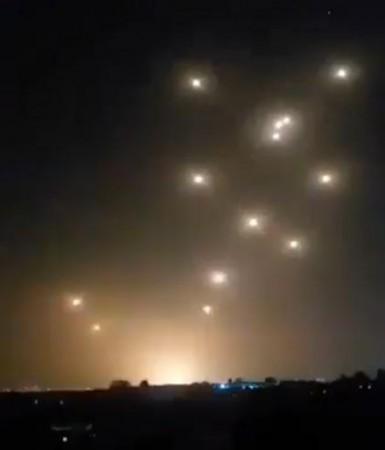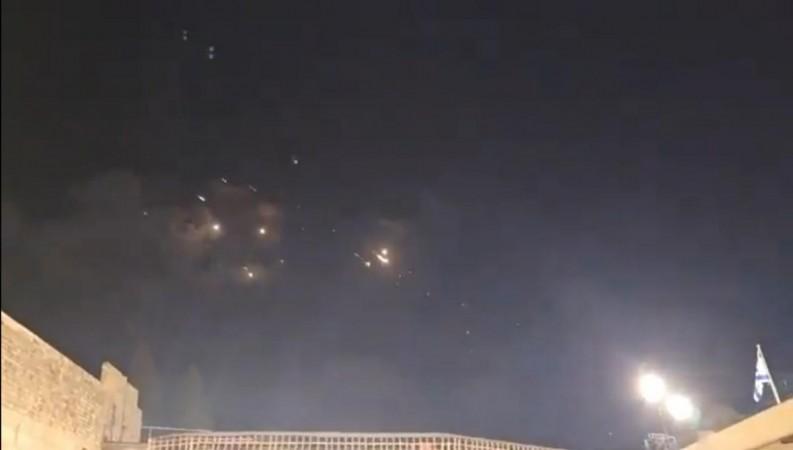
Iran launched a salvo of ballistic missiles at Israel on Tuesday night, in an unprecedented attack in retaliation for Israel's campaign against Tehran's Hezbollah allies in Lebanon.
The Iranian strikes have caused a ripple effect in the region, with neighboring countries closing their airspace and airlines scrambling to divert flights.
The missile attack has led to a significant disruption in air traffic in the region. FlightRadar24, a tracking service, reported that flights were diverted anywhere they could, with many converging on Cairo and Istanbul.
Istanbul and Antalya in southern Turkey were becoming congested, forcing some airlines to divert south. On Tuesday, about 80 flights, operated by major airlines such as Emirates, British Airways, Lufthansa, and Qatar Airways, were diverted to places such as Cairo and European cities.
Many airlines have also suspended flights to the region or are avoiding use of affected air space. The impact of the missile attack was not limited to the skies. Eurocontrol, a pan-European air traffic control agency, had warned pilots of the escalating conflict.
A major missile attack has been launched against Israel in the last few minutes, it said in an urgent navigation bulletin. At present the entire country is under a missile warning.
Regional Airspace Closures and Reopenings
Shortly afterwards, Eurocontrol announced the closure of Jordanian and Iraqi airspace, as well as the closure of a key crossing point into airspace controlled by Cyprus. An Iraqi pilot bulletin said its Baghdad-controlled airspace was closed until further notice, due to security concerns. Iraq's transport ministry later re-opened its airspace to civilian flights using its airports.
Jordan also re-opened its airspace after a closure following the volley of Iranian missiles towards Israel, the Jordanian state news agency said. Lebanon's airspace was closed to air traffic for a two-hour period on Tuesday, Transport Minister Ali Hamie said. The latest disruptions are expected to deal a further blow to an industry already facing curbs due to conflicts between Israel and Hamas, and Russia and Ukraine.

The international community has reacted with alarm to the escalating conflict. The Israeli embassy in Australia labeled Iran's attack as an act of aggression that endangers the stability of the entire Middle East region. The embassy called Iran the head of a murderous terrorist axis and called for the international community, including Australia, to isolate Iran, impose crippling sanctions on it, and designate the Revolutionary Guards as a terrorist organization.
Historical Echoes
The current situation bears a striking resemblance to the 2006 Lebanon War, also known as the July War, which was a 34-day military conflict in Lebanon, Northern Israel and the Golan Heights. The principal parties were Hezbollah paramilitary forces and the Israel Defense Forces (IDF). The conflict started on 12 July 2006, and continued until a United Nations -brokered ceasefire went into effect in the morning on 14 August 2006, though it formally ended on 8 September 2006 when Israel lifted its naval blockade of Lebanon.
The current conflict also echoes the 2014 Israel–Gaza conflict also known as Operation Protective Edge, which was a military operation launched by Israel on 8 July 2014 in the Hamas-ruled Gaza Strip. Following the IDF Operation Brother's Keeper, Hamas started rocket attacks, targeting Israeli cities and infrastructure, resulting in seven weeks of Israeli operations.
The United Nations Security Council scheduled a meeting about the Middle East for Wednesday, and the European Union called for an immediate ceasefire. Israel renewed its bombardment early on Wednesday of Beirut's southern suburbs, a stronghold of the Iran-backed armed Hezbollah group, with at least a dozen airstrikes against what it said were targets belonging to the group.
Large plumes of smoke were seen rising from parts of the suburbs. Israel issued new evacuation orders for the area, which have largely emptied after days of heavy strikes. Nearly 1,900 people have been killed and more than 9,000 wounded in Lebanon in almost a year of cross-border fighting, most in the past two weeks, according to Lebanese government statistics on Tuesday.
The recent escalation of tensions between Israel and Iran is a stark reminder of the volatility of the Middle East region. The international community is closely watching the situation, hoping for a swift resolution to the conflict.
The impact of the missile attack on air traffic and the potential for further escalation underscores the need for diplomatic efforts to resolve the situation and restore stability in the region. The historical parallels serve as a reminder of the potential for prolonged conflict and the urgent need for effective diplomatic intervention.

















